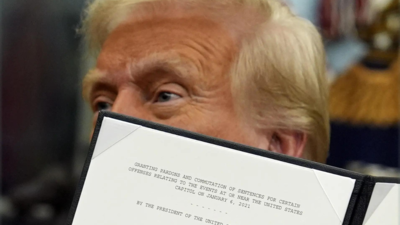Republican senators struggled to defend President Donald Trump‘s decision to commute and pardon hundreds of January 6 protesters, including those charged and convicted of crimes against police officers, just hours after he took office on Monday.
The move put Republicans in the awkward position of having to either defy Trump or defend releasing prisoners who attacked the very officers who protect the Capitol.
Sen. Thom Tillis, R-NC, who previously warned against giving a blanket pardon to the rioters, said, “I just can’t agree” with Trump’s decision, adding that it “raises a legitimate safety issues on Capitol Hill.” Senate Majority Leader John Thune, R-S.D., sidestepped questions about the pardons, saying, “We’re looking at the future, not the past,” as reported by CNN.
Sen. James Lankford, R-Okla., said he was still digesting the “details” of the pardons and commutations but emphasized that attacking a police officer is a “very serious issue” that should be punished. “I think we need to continue to say we are a party of law and order,” Lankford said.
Sens. Lisa Murkowski, R-Alaska, and Bill Cassidy, R-La., Republicans who voted to convict Trump after his second impeachment trial in 2021, also objected to his decision. Murkowski expressed concern about the message the pardons send to the US Capitol Police officers who protect lawmakers every day, while Cassidy stated, “I’m a big ‘back-the-blue’ guy. I think people who assault police officers — if they do the crime, they should do the time.”
When asked Tuesday whether he believed it was never acceptable to assault a police officer, Trump replied, “Sure.” Pressed on a specific case of an individual who drove a stun gun into the neck of a police officer but received a pardon, Trump said he didn’t know but would “take a look at everything.” He also claimed to be “the friend of police more than any president that’s ever been in this office.”
Even Vice President JD Vance said few days before taking office that those who committed violence on January 6 “obviously” shouldn’t be pardoned. When asked why Vance’s assertion was wrong, Trump said, “Well, only for one reason: They’ve served years in jail. They should not have served — excuse me — and they’ve served years in jail. … These were people that actually love our country, so we thought a pardon would be appropriate.”
Most Republicans wouldn’t weigh in on whether Trump had made the right decision, arguing that it was the president’s prerogative, not Congress’, to issue pardons. Sen. John Cornyn, R-Texas, and House Speaker Mike Johnson, R-La., echoed this sentiment, with Johnson stating, “It’s not my place. It’s the president’s sole decision, and he made a decision so I stand with him on it.”
When repeatedly asked about the pardons for individuals who attacked officers, Sen. Markwayne Mullin, R-Okla., largely redirected the discussion to Biden’s pardons, even as he agreed that January 6 was “no question” a “riot.” He said, “I have my personal feelings on it, but the American people have chosen to move on, and President Trump, it’s his prerogative to do this. … I get what you’re saying about the violent crime; however, that is still the president’s prerogative, just like it was Joe Biden’s prerogative.”
Sen. Steve Daines, R-Mont., would only say, “I’m grateful President Trump is the president of the United States” when asked for his reaction to the pardons.
The controversy is centred around US President Trump granting clemency to over 1,500 participants of the January 6 Capitol incident, encompassing leaders of the Proud Boys and Oath Keepers organisations on his Day 1 in office. The presidential pardons cover individuals found guilty of grave offences, notwithstanding resistance and documented proof of aggressive encounters.
The extended siege, lasting seven hours, caused injuries to more than 140 law enforcement personnel and resulted in the loss of life for four Trump supporters and five police officers, through both immediate and subsequent circumstances. The ensuing probe by the FBI and Justice Department evolved into the most extensive criminal investigation ever conducted in US history, with charges filed against more than 1,580 persons and successfully securing roughly 1,270 guilty verdicts.




